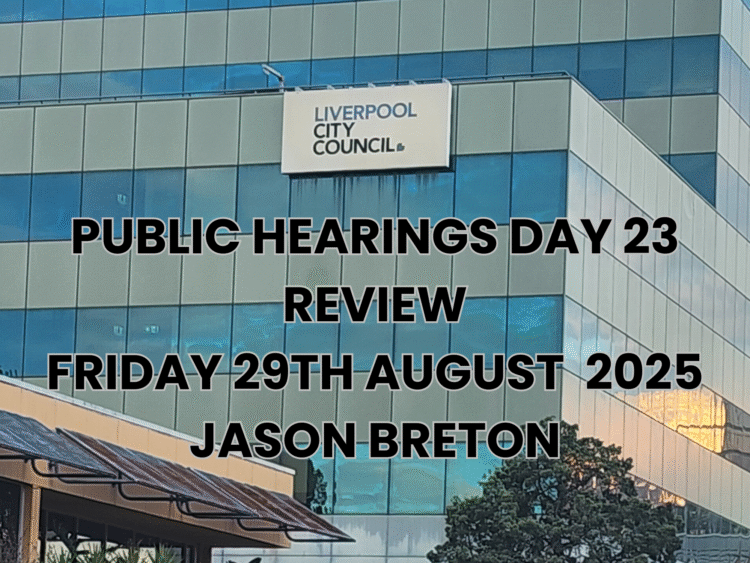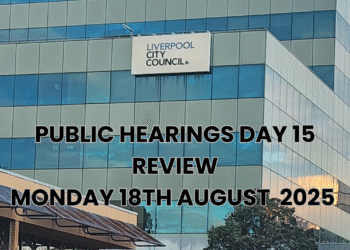Jason Breton’s Testimony: History and Abolition of the Internal Ombudsman Role
Mr Breton was questioned about the historical role of the internal Ombudsman at Liverpool City Council, a position established to handle complaints and ensure accountability. A policy document from 28 March 2018 outlined the Ombudsman’s responsibilities, which included managing customer complaints, assessing complex issues referred by the mayor, councillors, or CEO, handling privacy complaints, assisting with code of conduct complaints, managing public interest disclosures, training staff on complaint handling, and reviewing council policies and processes. Mr Breton confirmed his awareness of this role and policy.
The discussion then shifted to the abolition of the internal Ombudsman function around May 2023, as evidenced by a document dated approximately January to May 2023 from Mr Portelli. This document reiterated the Ombudsman’s roles, including acting as the complaints coordinator for code of conduct issues and other investigatory tasks as deemed appropriate by the CEO. Mr Breton noted that the decision to abolish the role was made during discussions between former CEO John Ajaka and Mr Portelli, and it did not fall under his directorate at the time (Operations), so he was not privy to the specific rationale behind the abolition.
Proposal to Reinstate the Internal Ombudsman
A significant focus of the session was a notice of motion from 23 July 2025 to re-establish an internal independent Ombudsman. This proposal, discussed in a council meeting agenda, highlighted concerns about the current complaints process managed solely by the council’s governance team, citing potential conflicts of interest and the risk of complaints being “weaponised” to silence legitimate criticism. The motion proposed appointing an independent Ombudsman to oversee code of conduct issues and public complaints, emphasizing impartiality and independence, and called for a framework to define the role’s appointment, powers, and responsibilities.
Mr Breton, in his capacity as CEO, provided comments on this motion, noting that the creation of such a position falls under the CEO’s purview. He argued that no evidence was presented in the motion to support claims of partiality or misuse of the complaints process. He referenced statistics showing that only 15 of 115 complaints had been concluded, and emphasised that misuse of the complaints procedure, if identified, could itself constitute a breach of the code of conduct. Additionally, he highlighted that the costs associated with establishing this role were outside the current budget and long-term financial plan, a point of contention for fiscal planning. The Commissioner clarified with Mr Breton that his response addressed two main concerns from the motion: the alleged inappropriate use of complaints to stifle criticism (for which he found no evidence) and the impartiality of the current process.
Matters of Importance to Liverpool Ratepayers
- Abolition and Potential Reinstatement of the Internal Ombudsman Role
Ratepayers should be informed about the historical abolition of the internal Ombudsman role in 2023 and the current push to reinstate it as an independent function. The Ombudsman was initially designed as a critical mechanism for handling complaints, ensuring transparency, and addressing issues like code of conduct breaches or public grievances. Its removal, without a clear public rationale as noted by Mr Breton, could be perceived by ratepayers as a reduction in accountability within the council, potentially allowing unresolved complaints or misconduct to go unchecked. The proposal to bring back an independent Ombudsman suggests recognition of past gaps in governance, but ratepayers might be skeptical about whether this is a genuine reform or a reactive measure prompted by the inquiry. This matters because an effective complaints system directly impacts trust in council operations and ensures ratepayer concerns are addressed fairly. - Financial Implications and Evidence of Complaints Management Issues
The financial aspect of reinstating the Ombudsman role, as highlighted by Mr Breton’s comment that it falls outside the current budget and long-term financial plan, is a significant concern for ratepayers. This could be perceived as an additional burden on public funds, especially if the council cannot demonstrate a clear need or benefit for the role. Furthermore, Mr Breton’s note that no evidence supports claims of partiality or misuse in the current complaints process (with only 15 of 115 complaints concluded) might alarm ratepayers about the efficiency and effectiveness of existing mechanisms. Ratepayers could interpret this as either a lack of serious issues (as suggested by Mr Breton) or as a backlog indicating systemic delays and inefficiencies, both of which affect the value they receive for their rates. Transparency in how complaints are managed and the justification for new expenditures are crucial for maintaining public confidence in council spending and governance.
Broader Implications
Day 23’s testimony reveals ongoing tensions within Liverpool City Council regarding how best to manage complaints and ensure accountability, as evidenced by the debate over the internal Ombudsman role. The historical decision to abolish the position and the current motion to reinstate it reflect shifting priorities and potential governance gaps that could impact service delivery and public trust. For ratepayers, these discussions underscore the importance of robust, transparent mechanisms to address grievances without undue cost or delay. The inquiry continues to probe these governance structures, with further examination expected in upcoming sessions to clarify the council’s approach to accountability and fiscal responsibility.



























